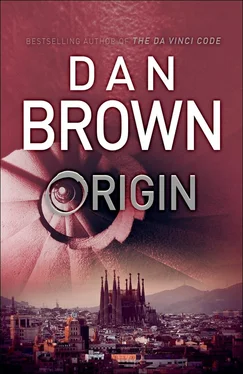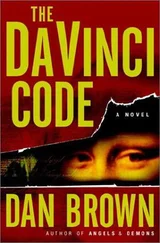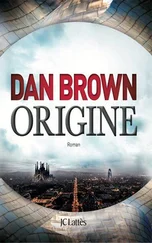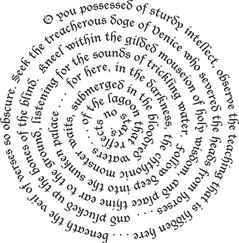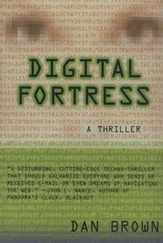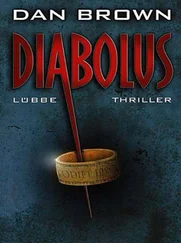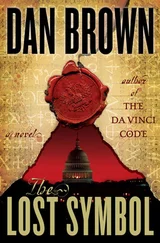Langdon expected more of a fight, but apparently two Rolls-Royce engines and a forty-ton jet were more than this fence post could take. With a metallic groan, the post tipped toward them, pulling with it a huge mound of asphalt attached to its base like the root ball of a toppled tree.
Langdon ran over and grabbed the fallen fence, pulling it down low enough that he and Ambra could make their way across it. By the time they staggered onto the tarmac, the jet’s gangway stairs had been deployed and a uniformed pilot was waving them aboard.
Ambra eyed Langdon with a tight smile. “Still doubting Winston?”
Langdon no longer had any words.
As they hurried up the staircase and into the plush interior cabin, Langdon heard the second pilot in the cockpit talking to the tower.
“Yes, control, I read you,” the pilot was saying, “but your ground radar must be miscalibrated. We did not leave the access ramp. I repeat, we are still squarely on the access ramp. Our warning light is now off, and we’re ready for takeoff.”
The copilot slammed the door as the pilot engaged the Gulfstream’s reverse thrust, inching the plane backward, away from the sagging fence. Then the jet began its wide turn back onto the runway.
In the seat opposite Ambra, Robert Langdon closed his eyes for a moment and exhaled. The engines roared outside, and he felt the pressure of acceleration as the jet thundered down the runway.
Seconds later, the plane was shooting skyward and banking hard to the southeast, plunging through the night toward Barcelona.
Rabbi Yehuda Köves rushed from his study, crossed the garden, and slipped out the front door of his home, descending the steps to the sidewalk.
I am no longer safe at home , the rabbi told himself, his heart pounding relentlessly. I must get to the synagogue.
The Dohány Street Synagogue was not only Köves’s lifelong sanctuary, it was a veritable fortress. The shrine’s barricades, barbed fences, and twenty-four-hour guards served as a sharp reminder of Budapest’s long history of anti-Semitism. Tonight, Köves felt grateful to hold the keys to such a citadel.
The synagogue was fifteen minutes away from his house — a peaceful stroll Köves took every day — and yet tonight, as he started out along Kossuth Lajos Street, he felt only fear. Lowering his head, Köves warily scanned the shadows before him as he began his journey.
Almost immediately he saw something that put him on edge.
A dark figure sat hunched on a bench across the street — a powerfully built man wearing blue jeans and a baseball cap — poking casually at his smartphone, his bearded face illuminated by the glow of the device.
He is not from this neighborhood , Köves knew, increasing his pace.
The man in the baseball cap glanced up, watched the rabbi a moment, and then returned to his phone. Köves pressed on. After one block, he glanced nervously behind him. To his dismay, the man in the baseball cap was no longer on the bench. He had crossed the street and was walking along the sidewalk behind Köves.
He’s following me! The old rabbi’s feet moved faster, and his breath grew short. He wondered if leaving his home had been a terrible mistake.
Valdespino urged me to stay inside! Whom have I decided to trust?
Köves had planned to wait for Valdespino’s men to come and escort him to Madrid, but the phone call had changed everything. The dark seeds of doubt were sprouting quickly.
The woman on the phone had warned him: The bishop is sending men not to transport you, but rather to remove you — just like he removed Syed al-Fadl. Then she had presented evidence so persuasive that Köves had panicked and fled.
Now, as he hurried along the sidewalk, Köves feared he might not reach the safety of his synagogue after all. The man in the baseball cap was still behind him, tailing Köves at about fifty meters.
A deafening screech tore through the night air, and Köves jumped. The sound, he realized with relief, was a city bus braking at a bus stop just down the block. Köves felt as if it had been sent by God Himself as he rushed toward the vehicle and scrambled aboard. The bus was packed with raucous college students, and two of them politely made room for Köves in front.
“ Köszönöm ,” the rabbi wheezed, breathless. Thank you.
Before the bus could pull away, however, the man in the jeans and baseball cap sprinted up behind the bus and narrowly managed to climb aboard.
Köves went rigid, but the man walked past him without a glance and took a seat in the back. In the reflection of the windshield, the rabbi could see that the man had returned to his smartphone, apparently engrossed in some sort of video game.
Don’t be paranoid, Yehuda , he chided himself. He has no interest in you.
When the bus arrived at the Dohány Street stop, Köves gazed longingly at the spires of the synagogue only a few blocks away, and yet he could not bring himself to leave the safety of the crowded bus.
If I get out, and the man follows me...
Köves remained in his seat, deciding he was probably safer in a crowd. I can just ride the bus for a while and catch my breath , he thought, although he now wished he had used the toilet before fleeing his home so abruptly.
It was only moments later, as the bus pulled away from Dohány Street, that Rabbi Köves realized the terrible flaw in his plan.
It’s Saturday night, and the passengers are all kids.
Köves now realized that everyone on this bus would almost certainly get off in the exact same place — one stop away, in the heart of Budapest’s Jewish quarter.
After World War II, this neighborhood had been left in ruins, but the decaying structures were now the hub of one of Europe’s most vibrant bar scenes — the famous “ruin bars” — trendy nightclubs housed in dilapidated buildings. On weekends, throngs of students and tourists gathered here to party in the bombed-out skeletons of graffiti-covered warehouses and old mansions, now retooled with the latest sound systems, colorful lighting, and eclectic art.
Sure enough, when the bus screeched to its next stop, all of the students piled out together. The man in the cap remained seated in the back, still engrossed in his phone. Instinct told Köves to get out as fast as he could, and so he clambered to his feet, hurried down the aisle, and descended into the crowd of students on the street.
The bus revved up to pull away, but then suddenly halted, its door hissing open to release one final passenger — the man in the baseball cap. Köves felt his pulse skyrocket once again, and yet the man did not glance even once at Köves. Instead, he turned his back to the crowd and walked briskly in the other direction, placing a phone call as he went.
Stop imagining things , Köves told himself, trying to breathe calmly.
The bus departed and the pack of students immediately began moving down the street toward the bars. For safety, Rabbi Köves would stay with them as long as possible, eventually making a sharp left and walking back toward the synagogue.
It’s only a few blocks , he told himself, ignoring the heaviness of his legs and the increasing pressure in his bladder.
The ruin bars were packed, their boisterous clientele spilling out into the streets. All around Köves, the sounds of electronic music throbbed, and the tang of beer permeated the air, mixing with the sweet fumes of Sopianae cigarettes and Kürtőskalács chimney cakes.
As he neared the corner, Köves still had the eerie sense he was being watched. He slowed down and stole one more glance behind him. Thankfully, the man in the jeans and baseball cap was nowhere to be seen.
Читать дальше
